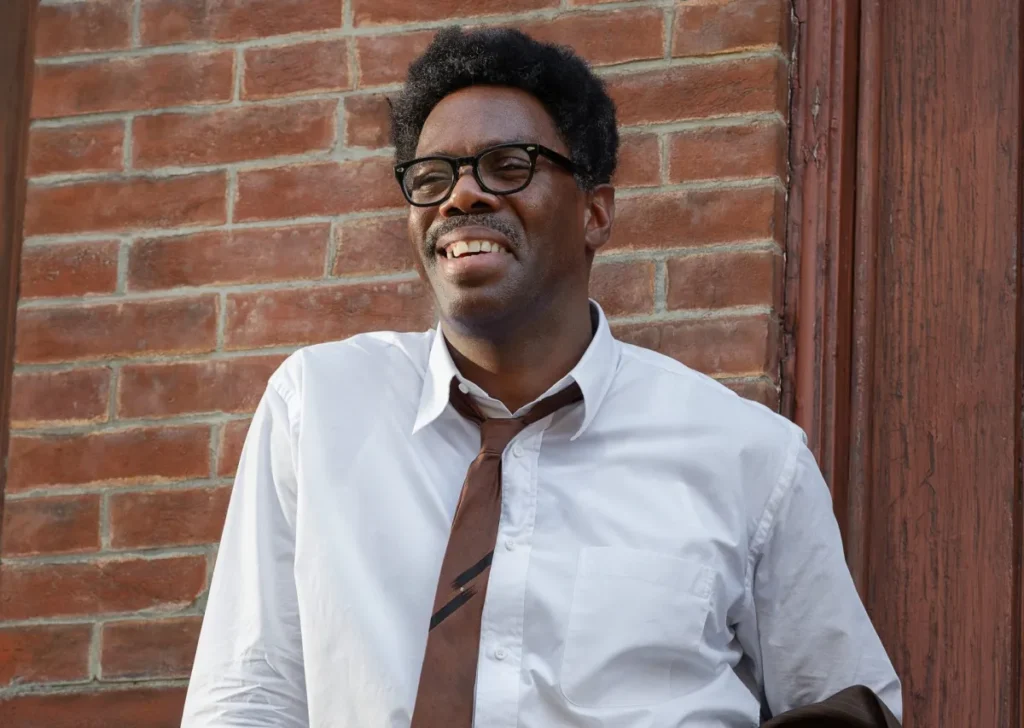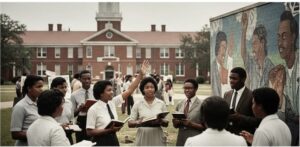Netflix’s ‘Rustin’: Powerful Tribute to Unseen Force Behind Martin Luther King Jr.’s Dream

by Magrira
The Netflix production “Rustin” is about one of the unsung leaders of the Civil Rights Movement, and I confess, I never knew his name. His name was Bayard Rustin, and he was silenced in large part because he was an African American gay man.
A. Gay. Man. It’s important to remember that the act of loving another of your own sex was against the law in his day. In retelling the story about peaceful protest against injustice run by the late Reverend Martin Luther King Jr., the name Rustin is rarely attached.
On the day the late King uttered those famous four words“ I have a dream” on August 28, 1963, on the steps of the Lincoln Memorial, the African American man was standing a bit out of focus, just over King’s right shoulder. That was Bayard Rustin: his right-hand man—the brains behind the idea. The man on the ground helping to make it happen.
History knows this event as “the greatest demonstration for freedom in the history of our nation,” organized by an African American gay man of great courage and even greater vision.
Rustin was awarded the Presidential Medal of Freedom posthumously by President Barack Obama a recognition for his deep and lasting contributions to the Civil Rights Movement. This man, packed with courage and wit, was nearly left out of history altogether because of his sexual orientation.
“Rustin” is beautifully directed by George C. Wolfe. It’s so simple that it could not have been told any other way. There’s no need for fancy cinematic acrobats. It is standing on the foundation of the truth.
There are so many great words peppered in this screenplay that I lost count, but one floated and remained in my brain: “When we tell ourselves such lies, we do the work of our oppressors,” Rustin said. True then. True, now.
I’m predicting accolades for the screenplay, written by Julian Breece (“When They See Us”) and Dustin Lance Black (“Milk”). Both are skilled storytellers who understand those inner workings surrounding the African American and LGBTQ+ causes.
“Rustin” is set in 1960, and it’s clear that Rustin and King are very good friends and that much like King, Rustin embraced nonviolence and peaceful protest. He convinced King to lead a march of 5,000 people. Sadly, King is scared off by his own leaders, including Rep. Adam Clayton Powell (Jeffrey Wright), who outright threatens to tell the press on “King and his queen,” a rumor that isn’t true but damaging nonetheless. Rustin resigns, and King allows him to do so. A rift begins.
Saddened by the disassociation with King, it took a moment for Rustin to bounce back, but when he did, he came up with the most ambitious gathering ever mobilized in the nation’s capital. Despite the fact that nine years previously, the Supreme Court had ruled segregation unconstitutional, the ugly truth of discrimination still very much in full force. White people in the American South hated African American people. Rustin believed, in his heart, that a unifying march would show the sheer power of solidarity.
Trade unionist A. Philip Randolph (Glynn Turman) supported Rustin. Others of note did not. This film does not shy away from presenting the infighting and how Rustin had to fight his own race.
Rustin turns the other cheek so many times, it’s a miracle he didn’t sprain his neck. Playing the role with the gentle nuance of a master, Domingo gives us a man dripping in wit and dignity; tall, wearing his thick-framed glasses, quick with a song. A noticeable gap in his upper front left teeth is an injury he wears as a badge of honor for a man who almost lost his life for standing up for his basic rights as a human being.
As for his sexual orientation, Rustin didn’t shy away from it. He was careful since it was, at the time, illegal to be a homosexual, but he didn’t live in shame. He did not (like so many) hate himself for being what God made him. There’s an interesting subplot where he has an affair with a fictional lover—Elias Taylor (Johnny Ramey), a married African American minister whose involvement in the movement was close enough to hurt both of their futures.
The film ends without the big-scale extras that would have been needed to truly bring in the impact. They didn’t do it—but we all know how it ends. We can simply go to YouTube to find out that 250,000 people attended the March on Washington, making it the largest peaceful protest to date.
“Rustin” airs on Netflix on November 17.
Production: Netflix release and presentation of a Higher Ground production. Producers: Bruce Cohen, Higher Ground’s Tonia Davis, George C. Wolfe. Executive producers: Barack Obama, Michelle Obama, Mark R. Wright, Alex G. Scott, David Permut, Daniel Sladek, Chris Taaffe.
Directed by George C. Wolfe. Screenplay by Julian Breece and Dustin Lance Black; story by Breece. Starring Colman Domingo, Chris Rock, Glynn Turman, Aml Ameen, Gus Halper, CCH Pounder, Da’Vine Joy Randolph, Johnny Ramey, Michael Potts, Lilli Kay, Jordan-Amanda Hall, Jakeem Powell, Grantham Coleman, Jamilah Rosmond, Jules Latimer, Maxwell Whittington-Cooper, Frank Harts, Kevin Mambo, Carra Patterson, Bill Irwin, Cotter Smith, Adrienne Warren, with Jeffrey Wright and Audra McDonald.






